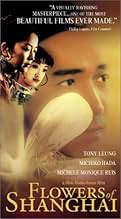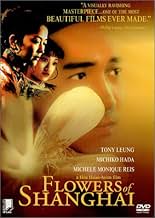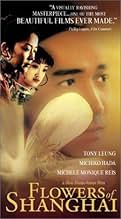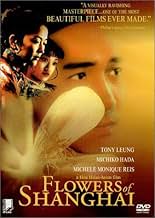PUNTUACIÓN EN IMDb
7,3/10
4,4 mil
TU PUNTUACIÓN
Añade un argumento en tu idiomaIn the "flower houses" (upscale brothels) of Shanghai, various interweaving stories of love, loyalty, and deceit play out subtly.In the "flower houses" (upscale brothels) of Shanghai, various interweaving stories of love, loyalty, and deceit play out subtly.In the "flower houses" (upscale brothels) of Shanghai, various interweaving stories of love, loyalty, and deceit play out subtly.
- Dirección
- Guión
- Reparto principal
- Premios
- 6 premios y 6 nominaciones en total
Tony Leung Chiu-wai
- Wang Lingsheng
- (as Tony Chiu Wai Leung)
Michelle Reis
- Emerald
- (as Michelle Monique Reis)
Carina Lau
- Pearl
- (as Carina Lau Ka-ling)
Rebecca Pan
- Huang
- (as Rebecca Pan Wan-ching)
Tony Chang
- Peking Opera Actor
- (as Tony Chang Ruei-che)
Yiu-Ming Lee
- Azhu
- (as Yu-ming Lee)
Reseñas destacadas
10dave-593
Hou Hsiao-Hsien's "Flowers of Shanghai" is an opium dream of a movie: visually and aurally there is no mistaking that this is the work of an artist with the imagination of a poet, and the precision of a clockmaker. The opening shot is among the most exquisite in all of cinema: a veritable tour de force that exudes Hou's love for the film medium, but is decidedly restrained and controlled, never allowing style to upstage the narrative and degenerate into mere spectacle. In keeping with the film's setting and rules of patriarchy, the major male characters are introduced first. The women serving these men are then introduced in the following "chapters", each one preceded by title cards announcing their names and place of residence as if gently mocking or subverting the patriarchical order.
This chamberpiece drama of sexual intrigue and power struggle is astonishingly acute in capturing the feel and sensibilities of the late 19th century but expressed in very contemporary terms without any apparent compromises or contradictions. The painterly colors of "Flowers" may invite comparison with Dutch masters like Vermeer even when Hou is deliberately conjuring an idealized world that is as hermetic as it is artificial: a world composed entirely without natural light is like a dream, hauntingly beautiful and intense but impossible to hold or to keep. That the film is shot entirely indoors and the mise-en-scene is orchestrated without any close-ups is a testament of Hou's faith and supreme confidence in creating a work that remains completely cinematic while averting the pitfalls of feeling stage bound. Despite the subject matter what is also startling is the complete absence of physical sex on screen; and, yet the film manages to sustain an erotically charged atmosphere.
Beginning with "The Puppetmaster" Hou has been increasingly moving towards a more minimalist form of cinema, stripping the narrative of everything that is superfluous until nothing is left but its emotional core, naked and unadulterated. "Flowers" is very much an interior film that does not depend on voiceover narration to make thoughts explicit. Hou's almost static camera continues to favor long medium takes ranging from 5 to 7 minutes, framing key characters sharing the same space and time, but well within reach of each other, capturing the subtle interplay and nuances while allowing them to drift in and out of the picture frame according to their relative importance in the social hierarchy. In this manner an entire community is evoked: demonstrating that the window to the world is precisely through the interior lives of individuals responsible for shaping the body politic.
This chamberpiece drama of sexual intrigue and power struggle is astonishingly acute in capturing the feel and sensibilities of the late 19th century but expressed in very contemporary terms without any apparent compromises or contradictions. The painterly colors of "Flowers" may invite comparison with Dutch masters like Vermeer even when Hou is deliberately conjuring an idealized world that is as hermetic as it is artificial: a world composed entirely without natural light is like a dream, hauntingly beautiful and intense but impossible to hold or to keep. That the film is shot entirely indoors and the mise-en-scene is orchestrated without any close-ups is a testament of Hou's faith and supreme confidence in creating a work that remains completely cinematic while averting the pitfalls of feeling stage bound. Despite the subject matter what is also startling is the complete absence of physical sex on screen; and, yet the film manages to sustain an erotically charged atmosphere.
Beginning with "The Puppetmaster" Hou has been increasingly moving towards a more minimalist form of cinema, stripping the narrative of everything that is superfluous until nothing is left but its emotional core, naked and unadulterated. "Flowers" is very much an interior film that does not depend on voiceover narration to make thoughts explicit. Hou's almost static camera continues to favor long medium takes ranging from 5 to 7 minutes, framing key characters sharing the same space and time, but well within reach of each other, capturing the subtle interplay and nuances while allowing them to drift in and out of the picture frame according to their relative importance in the social hierarchy. In this manner an entire community is evoked: demonstrating that the window to the world is precisely through the interior lives of individuals responsible for shaping the body politic.
The Taiwanese writer-director Hou Hsiao-hsien is regarded by many as the greatest living filmmaker, and FLOWERS OF SHANGHAI is widely considered one of the strongest contemporary movies. Hou's approach is both anthropological and highly formalized: this examination of the economics and Machiavellian power politics of a Shanghai brothel in the mid-1800's stays remote. The feeling is sometimes that of a news crew eager not to intrude, but the mise-en-scene evokes the mastery of space-carving in Kurosawa's HIGH AND LOW or Bresson's UNE FEMME DOUCE. Shot in wide, mobile masters that go on for four or five minutes at a stretch, FLOWERS is theatrical in the extreme, and, as in a Yuan drama or a Kun opera, Hou stays at a more than respectful reserve from his characters. For some, this spells high-art elegance; others may feel starved for vividness and human immediacy, and wish the film to end far sooner than it does.
10pcg
This hypnotically beautiful film may recall a dream, but the material world of money and power, indentured servitude and beatings everywhere intrudes on it. We discover in the contrasting stories of Emerald, Pearl, Crimson, Jade, and Crystal, how some survive as "flower girls" and others are crushed. Far from being boring or cold, the film is compelling dramatically and emotionally. "Flowers of Shanghai" seems to contain boundless reserves of sadness and rage -- it is as if the sex and violence are not on screen because Hou cannot bear to show them. If "Flowers of Shanghai" is an opium dream, as many have said, the opium is both bringing pleasure and suppressing pain.
"Flowers of Shanghai" shows compassion for its characters, both the innocents and those who survive through cynical manipulation. The scene-length takes in medium shots work to establish respect for each person within the film, while at the same time bringing about a kind of "rectification of names," systematically exposing the hypocrisy of the brothels. It's appropriate that one of the few moments of violent action in the film occurs when Master Wang smashes the exquisite interior decoration in a room: "Flowers of Shanghai" shows the seductive beauty of the brothel then reveals it to be a cage. Everyone in the film is on multiple levels unfree: the women are financially bound to the brothels and dependent on the whims of their clients, and almost everyone is addicted to opium.
The film never leaves the brothels. This expresses how the brothels in fact own the women. However, as Stephen Teo noted in CinemaScope, there's another detail that's easy to overlook: the women's bound feet prevent them from easily walking more than a few feet.
"Flowers of Shanghai" shows compassion for its characters, both the innocents and those who survive through cynical manipulation. The scene-length takes in medium shots work to establish respect for each person within the film, while at the same time bringing about a kind of "rectification of names," systematically exposing the hypocrisy of the brothels. It's appropriate that one of the few moments of violent action in the film occurs when Master Wang smashes the exquisite interior decoration in a room: "Flowers of Shanghai" shows the seductive beauty of the brothel then reveals it to be a cage. Everyone in the film is on multiple levels unfree: the women are financially bound to the brothels and dependent on the whims of their clients, and almost everyone is addicted to opium.
The film never leaves the brothels. This expresses how the brothels in fact own the women. However, as Stephen Teo noted in CinemaScope, there's another detail that's easy to overlook: the women's bound feet prevent them from easily walking more than a few feet.
At the end of the 19th century, Chinese officials used to spend their leisure time in lush brothels in the British concession of Shanghai. Hou Hsiao-Hsien's 'Hai Shang Hua' depicts the intricate social network sustained in those premises by the customers, the girls (called flowers) and the Madams. The personal relations in those brothels were ruled by pleasure, money, love and social status in a perfect parallel to the 'outside' society, which, in turn, is perceived throughout the film almost as unreal. Hou is a master creating ambiences: the film transmits an extraordinarily subtle feeling of warmth and suffocation fostered by a miraculous music. With neither a beginning nor an end, this superb film is not apt for those looking for adventures and easy-to-tell stories.
This is a film for patient and serious film-lovers. From the first scene, one face takes almost complete possession of the screen - that of Tony Leung. There he is, a silent member of a group of drinking men, and just try to take your eyes off him. Throughout the entire film, he dominates, but that is exactly right for this tale of obsessive love in a 'house of flowers'. A totally fascinating film.
¿Sabías que...?
- CuriosidadesThe film consists of 38 long shots.
- ConexionesFeatured in Historias de Shanghai (2010)
Selecciones populares
Inicia sesión para calificar y añadir a tu lista para recibir recomendaciones personalizadas
- How long is Flowers of Shanghai?Con tecnología de Alexa
Detalles
Contribuir a esta página
Sugerir un cambio o añadir el contenido que falta

































